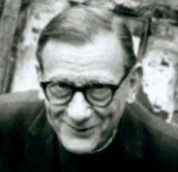For the Cardinal under Ban, the Quarantine Has Ended
By Sandro Magister
ROME, May 11, 2012 – "Windows open on the mystery": this is the title of the conference with which, two days ago, the Pontifical University of the Holy Cross broke the silence on one of the greatest theologians of the twentieth century, the French Jesuit Jean Danielou, made a cardinal by Paul VI in 1969. A silence that lasted almost forty years, and began with his passing away in 1974. In effect, the memory of Danielou is today reduced, for many, to the mystery of his death by heart attack, one May afternoon, at the home of a prostitute on the fourth floor of Rue Dulong 56 in Paris. When in reality the true mystery on which Danielou opened the windows to many, in his activity as a theologian and a spiritual man, is that of the triune God. One of his greatest works was entitled "An essay on the mystery of history." A history not governed by chance, nor by necessity, but filled with the "magnalia Dei," by the grandiose wonders of God, each more astonishing than the last. Today, few of his books are still available for purchase. And yet they are still of extraordinary richness and freshness. Simple and yet very profound, as few theologians have been able to do over the last century, apart from him and that other champion of clarity named Joseph Ratzinger. Danielou stands alongside the current pope because of the historical rather than philosophical framing of his theology, his expertise in the Fathers of the Church (the one enamored with Gregory of Nyssa, the other with Augustine), the completely central role given to the liturgy. Danielou, together with his Jesuit confrere Henri De Lubac, was the brilliant initiator in 1942 of the series of patristic texts entitled "Sources Chretiennes," which marked the rebirth of theology in the second half of the twentieth century and paved the way for the best of Vatican Council II. An author, in short, absolutely to rediscover. But the mystery of his death and of the taciturn explanation that followed it must also be resolved. Mimi Santoni, the prostitute, saw him fall to his knees with his face on the floor before he breathed his last. And to her "it was a good death, for a cardinal." He had gone to bring her money to pay for a lawyer capable of getting her husband out of prison. It was the last of his works of charity carried out in secret, on behalf of despised persons in need of help and forgiveness. The Jesuits conducted exhaustive investigations to discover the truth. They ascertained his innocence. But they also shrouded the case in a silence that did not dispel the suspicions. The rupture between Danielou and his other Jesuit confreres in Paris and the rest of France was in effect the true origin of the neglect that fell upon this great theologian and cardinal. A rupture that preceded his death by at least two years. Since 1972, in fact, Danielou had no longer been living in the residence of "Etudes," the leading cultural magazine of the French Jesuits, where he had lived for decades. He had moved to a convent of sisters, the Daughters of the Heart of Mary. The clash had been precipitated by an interview with Danielou on Vatican Radio in which he harshly criticized the "decadence" that was devastating so many men's and women's religious orders, because of "a false interpretation of Vatican II." The interview was interpreted as an accusation brought against the Society of Jesus itself, the superior general of which at the time was Father Pedro Arrupe, who was also the head of the union of superiors general of religious orders. The Jesuit Bruno Ribes, director of "Etudes," was one of the most active in making scorched earth around Danielou. The positions of the two had become antithetical. In 1974, the year of Danielou's death, Ribes positioned "Etudes" in open disobedience with respect to the teaching of the encyclical "Humanae Vitae" on contraception. And he collaborated with other "progressive" theologians – including the Dominicans Jacques Pohier and Bernard Quelquejeu – in the drafting of the law that in that same year introduced unrestricted abortion in France, with Simone Veil as health minister, Valery Giscard d'Estaing as president, and Jacques Chirac as prime minister. The following year, 1975, Father Ribes left the helm of "Etudes." And afterward he abandoned the Society of Jesus, and then the Catholic Church. The following is the interview that earned Danielou his ostracism. Forty years later, the decline of the religious orders denounced in it is still in progress, as proven in the United States by the saga of the "Leadership Conference of Women Religious":
|
.
Any original material on these pages is copyright © BishopAccountability.org 2004. Reproduce freely with attribution.
